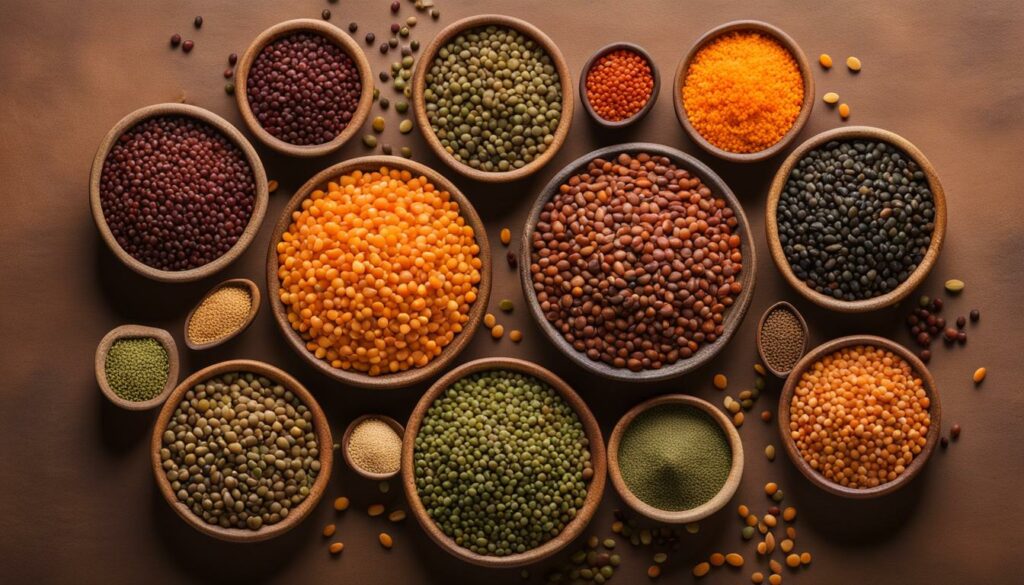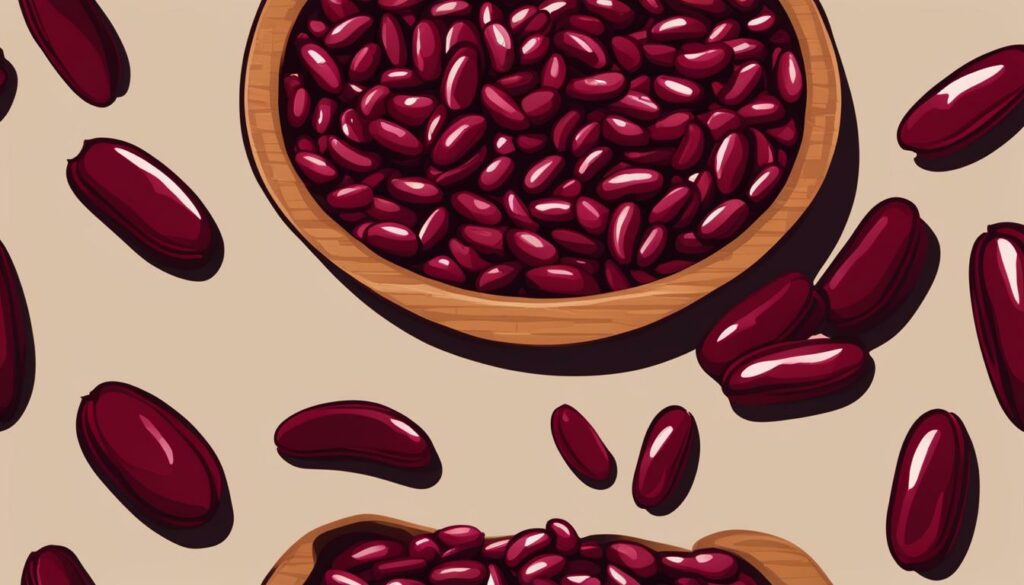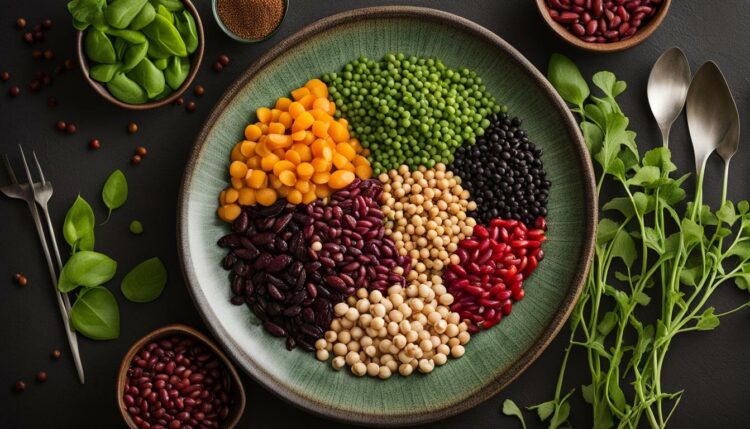Legumes are a group of plants that include beans, peas, lentils, and more. They are incredibly nutritious and provide a wide range of health benefits. In this article, we will explore the healthiest legumes and why they should be a part of your diet.
Legumes are packed with fiber, essential vitamins and minerals, and plant-based protein. They are also low in fat and have a low glycemic index, making them great for managing blood sugar levels. Incorporating legumes into your meals can help improve your overall health and well-being.
Key Takeaways:
- Legumes are a group of plants that include beans, peas, lentils, and more.
- They are rich in fiber, essential vitamins and minerals, and plant-based protein.
- Legumes are low in fat and have a low glycemic index, making them great for managing blood sugar levels.
- Including legumes in your diet can help improve your overall health and well-being.
- Stay tuned to discover the nine healthiest legumes and their specific health benefits!
Chickpeas
Chickpeas, also known as garbanzo beans, are a versatile legume that offers a myriad of health benefits. They are packed with fiber and protein, making them an excellent addition to a balanced diet. Chickpeas are low in calories yet high in nutrients, making them a satisfying and nutritious choice for any meal.
One of the outstanding health benefits of chickpeas is their potential to reduce blood sugar levels. The fiber content in chickpeas slows down the absorption of sugars, preventing glucose spikes and promoting stable blood sugar levels. Incorporating chickpeas into your diet may help manage conditions like diabetes or insulin resistance.
>Another advantage of chickpeas is their positive impact on gut health. The fiber in chickpeas acts as a prebiotic, providing nourishment for beneficial gut bacteria. A healthy gut microbiome is essential for digestion, nutrient absorption, and overall well-being.
| Nutrient | Amount per 1 cup (164g) of Cooked Chickpeas |
|---|---|
| Calories | 269 |
| Protein | 14.5g |
| Fiber | 12.5g |
| Carbohydrates | 45g |
| Fat | 4.2g |
| Vitamin C | 6.1mg |
| Vitamin K | 13mcg |
| Folate | 282mcg |
| Iron | 4.74mg |
Chickpeas can be enjoyed in various dishes, including salads, soups, and stews. They can also be mashed or ground into flour to create delicious baked goods. Incorporating chickpeas into your diet is a wonderful way to boost your overall health and enjoy their unique flavor and texture.
Try this simple and nutritious recipe: Chickpea Salad
Ingredients:
- 2 cups cooked chickpeas
- 1 cucumber, diced
- 1 tomato, diced
- 1/4 red onion, thinly sliced
- 1/4 cup chopped parsley
- Juice of 1 lemon
- 2 tablespoons olive oil
- Salt and pepper to taste
Instructions:
- In a large bowl, combine the chickpeas, cucumber, tomato, red onion, and parsley.
- In a small bowl, whisk together the lemon juice, olive oil, salt, and pepper.
- Pour the dressing over the salad and toss to coat evenly.
- Refrigerate for at least 30 minutes to allow the flavors to meld together.
- Serve chilled and enjoy!
Experience the delicious taste and numerous health benefits of chickpeas by incorporating them into your favorite recipes. Whether you’re seeking a protein-packed salad or a comforting stew, chickpeas are sure to add flavor, texture, and nutritional value to your meals.
Lentils
Lentils are a nutrient-dense legume that offer numerous health benefits. They are a great source of vegetarian protein and iron, making them an essential part of a balanced diet, especially for vegans and vegetarians who may be at risk for iron deficiency anemia. Let’s take a closer look at the health benefits of lentils and their nutritional value.
Lentils have been consumed for centuries and are a staple in many cuisines around the world. They come in various colors, including green, brown, yellow, and red. Each type has a slightly different flavor and cooking time, but they all share similar health benefits.
One of the key health benefits of lentils is their high protein content. They provide a valuable source of plant-based protein, making them an excellent choice for vegetarians and vegans. Lentils are also rich in dietary fiber, which helps promote healthy digestion and can aid in weight management.
Another major benefit of lentils is their positive impact on blood sugar levels. Lentils have a low glycemic index, which means they are digested and absorbed slowly, causing a gradual rise in blood sugar levels. This makes them a suitable food choice for those with diabetes or individuals looking to manage their blood sugar levels.
Furthermore, lentils are packed with essential nutrients. They are a good source of folate, which is important for pregnant women to support fetal development. Lentils also contain potassium, magnesium, and various B vitamins, contributing to heart health and overall well-being.
To illustrate the nutritional content of lentils, here is a table outlining their key nutritional values per 100g:
| Nutrient | Amount per 100g |
|---|---|
| Protein | 9g |
| Fiber | 7.9g |
| Iron | 3.3mg |
| Folate | 181μg |
| Potassium | 369mg |
| Magnesium | 36mg |
| Vitamin B6 | 0.2mg |
As you can see, lentils provide a substantial amount of protein, fiber, iron, and other important nutrients. They are a versatile ingredient that can be used in a variety of dishes, such as soups, stews, salads, and grain bowls.
“Lentils are a nutritious and delicious addition to any diet. They offer a wide range of health benefits, from providing essential nutrients to supporting heart health and managing blood sugar levels.”
So, whether you’re a vegetarian, vegan, or simply looking to incorporate more nutritious foods into your meals, lentils are an excellent choice. Add them to your grocery list and explore the many delicious recipes that showcase the versatility and health benefits of lentils.

To summarize, the health benefits of lentils include:
- High protein content, making them a valuable source of vegetarian protein
- Rich in dietary fiber, promoting healthy digestion
- Low glycemic index, aiding in blood sugar management
- Good source of folate, supporting fetal development
- Contain potassium, magnesium, and B vitamins for heart health
Make lentils a regular part of your meals and reap the nutritional rewards they offer.
Peas
Peas are a type of legume that offer numerous health benefits. They are not only tasty but also packed with essential nutrients.
One of the key advantages of peas is their high protein content. They provide a substantial amount of plant-based protein, making them a great choice for vegetarians and vegans. Additionally, peas are an excellent source of fiber, which promotes a healthy digestive system and helps to maintain a feeling of fullness.
Peas are rich in vitamin K, an important nutrient that plays a role in blood clotting and bone health. Vitamin K is also known for its potential to prevent age-related cognitive decline and reduce the risk of osteoporosis.
These legumes are also low on the glycemic index, meaning they have a minimal impact on blood sugar levels. This makes peas a suitable option for individuals with diabetes or those looking to manage their blood sugar levels.
To reap the benefits of peas, try incorporating them into your diet in various ways. You can add them to salads, soups, or stir-fries, or enjoy them as a side dish. They are also a delicious addition to pasta dishes and risottos.
Next, we’ll explore the health benefits of kidney beans, another nutrient-rich legume that deserves a spot in a balanced diet.
Kidney Beans
Kidney beans are a nutritious legume packed with health benefits. These beans are an excellent source of fiber, which plays a crucial role in maintaining optimal blood sugar levels.
Including kidney beans in your diet can help regulate blood sugar and prevent spikes that contribute to diabetes and other metabolic disorders. Additionally, the high fiber content promotes digestive health, supporting regular bowel movements and preventing constipation.
One serving of kidney beans provides a significant amount of folate, an essential nutrient, especially during pregnancy. Folate is crucial for the development of the baby’s neural tube and can help prevent certain birth defects.
Below is a breakdown of kidney bean nutrition facts per 100 grams:
| Nutrient | Amount per 100g |
|---|---|
| Calories | 123 |
| Protein | 8.7g |
| Fat | 0.5g |
| Carbohydrates | 22.8g |
| Fiber | 6.4g |
| Folate | 407mcg |
| Potassium | 406mg |
| Magnesium | 52mg |
Source: USDA National Nutrient Database
Try this recipe: Kidney Bean Salad
Ingredients:
- 1 can kidney beans, drained and rinsed
- 1 bell pepper, diced
- 1 cucumber, diced
- 1/4 red onion, thinly sliced
- 2 tablespoons olive oil
- 1 tablespoon lemon juice
- 1 teaspoon dried oregano
- Salt and pepper to taste
Instructions:
- In a large bowl, combine the kidney beans, bell pepper, cucumber, and red onion.
- In a small bowl, whisk together the olive oil, lemon juice, dried oregano, salt, and pepper.
- Pour the dressing over the bean mixture and toss until well coated.
- Refrigerate for at least 30 minutes to allow the flavors to meld together.
- Serve chilled and enjoy!
Incorporating kidney beans into your meals is an excellent way to boost your fiber intake and reap the numerous health benefits they offer. Try adding kidney beans to soups, stews, or salads for a nutritious and flavorful addition to your diet.

Black Beans
Black beans are a versatile legume that provides numerous health benefits. Not only are they delicious, but they also offer a range of nutrients that can support overall well-being.
One of the key health benefits of black beans is their positive impact on gut health. Rich in fiber, black beans promote healthy digestion and can help prevent constipation. The fiber content also supports the growth of beneficial gut bacteria, which plays a crucial role in maintaining a healthy digestive system.
Additionally, black beans are a great food choice for managing blood sugar levels. They have a low glycemic index, which means they are digested slowly and cause a gradual rise in blood sugar levels. This makes them a suitable option for individuals with diabetes or those looking to maintain stable blood sugar levels.
Black beans are also packed with protein, making them an excellent source of plant-based protein for vegetarians and vegans. Protein is essential for building and repairing tissues in the body, and incorporating black beans into your diet can help meet your protein needs.
To fully understand the nutritional benefits of black beans, let’s take a look at their nutrition facts:
| Nutrient | Amount per 1 cup (172g) |
|---|---|
| Calories | 227 |
| Protein | 15g |
| Fiber | 15g |
| Carbohydrates | 41g |
| Fat | 0.9g |
| Potassium | 611mg |
| Iron | 3.6mg |
As you can see, black beans are a nutrient-dense food with high levels of protein, fiber, and important minerals like iron and potassium.
There are many delicious ways to incorporate black beans into your meals. They can be added to salads, soups, stews, or used as a filling for tacos or burritos. You can also blend them into dips or make black bean burgers for a satisfying and nutritious meal.
In conclusion, black beans are a powerhouse legume that provides an array of health benefits. From supporting gut health to helping manage blood sugar levels, they are a worthy addition to any balanced diet.
Conclusion
All legumes mentioned in this article are nutritious and provide various health benefits. From chickpeas to kidney beans, these legumes are packed with fiber, protein, and essential vitamins and minerals. They are an excellent addition to a healthy diet and can be enjoyed in a variety of dishes.
By incorporating legumes into your meals, you can take advantage of their numerous health benefits. They can help reduce cholesterol levels, regulate blood sugar, improve gut health, and support overall well-being. Whether you’re a vegetarian, vegan, or simply looking to add more plant-based protein to your diet, legumes are a great choice.
To incorporate legumes into your diet, try out some legume recipes. You can make hearty soups, flavorful salads, or even delicious dips. With their versatile nature, legumes can be used as a main ingredient or as a compliment to other dishes. Get creative in the kitchen and explore the culinary possibilities of these healthy legumes.
FAQ
Which legumes are the healthiest?
Chickpeas, lentils, peas, kidney beans, and black beans are considered some of the healthiest legumes.
What are the health benefits of legumes?
Legumes are rich sources of fiber, essential vitamins and minerals, and plant-based protein. They can reduce cholesterol, decrease blood sugar levels, and promote a healthy gut.
What are the different types of legumes and their health benefits?
Chickpeas (garbanzo beans) are a great source of fiber and protein. Lentils are a good source of vegetarian protein and iron. Peas are high in protein, fiber, and vitamin K. Kidney beans are high in fiber and folate. Black beans are a good source of fiber and protein.
What are the nutrition facts of chickpeas?
Chickpeas, also known as garbanzo beans, are low in calories and high in fiber and protein. They can help reduce blood sugar levels and improve gut health.
What are the health benefits of lentils?
Lentils are a good source of vegetarian protein and iron. They can help reduce blood sugar levels and improve heart health. They are also beneficial for vegans and vegetarians at risk for iron deficiency anemia.
What are the nutrition facts of peas?
Peas are high in protein, fiber, and vitamin K. They can promote a healthy gut and help maintain healthy blood sugar levels.
What are the health benefits of kidney beans?
Kidney beans are high in fiber, which can help reduce blood sugar levels. They are also a good source of folate, which is important during pregnancy.
What are the nutrition facts of black beans?
Black beans may help improve gut health and blood sugar management. They are also a good source of fiber and protein.
Conclusion
All the legumes mentioned in this article are nutritious and provide various health benefits. They are versatile and can be incorporated into a variety of dishes, making them an excellent addition to a balanced diet.




